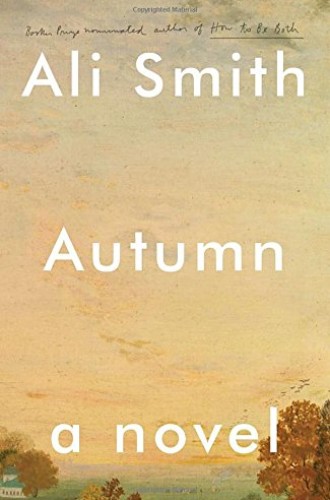The autumn of our discontent
As leaves fall from the trees, Ali Smith helps us fall into the dreams and fears of her characters.
Ali Smith’s new novel, which has just made the shortlist for the 2017 Booker Prize, is delightfully enigmatic. The first of a quartet of seasonally-named novels, Autumn begins in a dreamscape and returns often to memories and dreams. One elderly character, Daniel, bedridden and unable to communicate, finds himself trapped inside the trunk of a tree:
It smells like a pine. He’s got no real way of telling. He can’t move. There’s not much room for movement inside a tree. His mouth and eyes are resined shut. . . . But the scent lightens despair. It’s perhaps a little like wearing a coat of armour except much nicer, because the armour is made of a substance through which the years themselves, formative, have run.
From the tree trunk, in his bed, he imagines an encounter with a celebrity and recalls a childhood moment with his sister. After pages and pages of memories, he returns to the tree, hoping for metamorphosis: “Cut this tree I’m living in down. Hollow its trunk out. Make me all over again, with what you scooped out of its insides. Slide the new me back inside the old trunk.” Evocative as it is, this vision doesn’t make a lot of sense. It happens early in the narrative, when readers don’t know Daniel well enough to guess at the beliefs or memories that create it.
Later another character, Elisabeth, recalls a moment from her childhood when she and Daniel created a story about a man with a gun and a person in a tree costume. “Just as the man with the gun is finally about to shoot, the person dressed as a tree transforms before the gunman’s eyes into a real tree, a giant tree, a magnificent golden ash tree towering high above waving its mesmerizing leaves. No matter how hard the man with the gun shoots at this tree he can’t kill it with bullets.” The threads of Daniel’s dream and Elisabeth’s memory begin to come together.
These playfully surreal scenes are interspersed with everyday life in an English village immediately after the Brexit vote. Not much happens in terms of plot. Elisabeth attempts to renew her passport. Daniel dreams from his coma-like state. Elisabeth’s mother goes on a reality TV show.
But looming over these events is the social unrest that follows the vote. Someone paints “GO HOME” on a house, and someone later paints: “WE ARE ALREADY HOME THANK YOU.” Spanish tourists are heckled at a train station. Elisabeth, listening to a debate about immigration on the news, thinks “It’s like democracy is a bottle someone can threaten to smash and do a bit of damage with. . . . It is the end of dialogue.”
When Elisabeth and her mother go for a stroll one day and find that a chain-link fence has been built across their favorite walking path, stretching in both directions as far as the eye can see, her mother collapses to the ground and complains:
I’m tired of the vitriol. I’m tired of the anger. I’m tired of the meanness. I’m tired of the selfishness. I’m tired of how we’re doing nothing to stop it. . . . I’m tired of people not caring whether they’re being lied to any more. I’m tired of being made to feel this fearful. I’m tired of animosity. I’m tired of pusillanimosity.
Elisabeth responds, “I don’t think that’s actually a word,” to which mother replies, “I’m tired of not knowing the right words.” Meanwhile:
All across the country, people felt it was the wrong thing. All across the country, people felt it was the right thing. All across the country, people felt they’d really lost. All across the country, people felt they’d really won. All across the country, people felt they’d done the right thing and other people had done the wrong thing. . . . All across the country, people felt legitimized. All across the country, people felt bereaved and shocked. All across the country, people felt righteous. All across the country, people felt sick. All across the country, people felt history at their shoulder. All across the country, people felt history meant nothing.
I’ve seen no better description of a shattered nation immediately after a contentious election. These descriptions (which go on for pages) are difficult to read, but they’re leavened by the colorful dreams and memories that accompany them. Smith’s surreal, funny, bittersweet fictional prose feels utterly authentic, even at its most fantastical. I’m right there by the fence with Elisabeth’s mother, sharing in her resignation—but I’m also right there in the tree trunk beside Daniel, my eyes resined shut. It’s an odd experience to live in someone else’s dreams, but Smith manages to pull it off beautifully.







